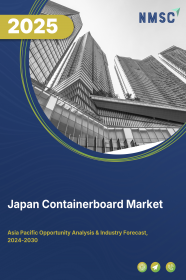
Japan Containerboard Market by Material (Virgin Fibres, Recycled Fibres, and Mixed Fibres), by Type (Linerboard and Flutting), by Wall Type (Single Face, Single Wall, Double Wall, and Triple Wall), and by End-User (Food and Beverage, Consumer Electronics, Personal Care and Cosmetics, and Others End-User) – Opportunity Analysis and Industry Forecast, 2024–2030
Industry: Materials and Chemical | Publish Date: 06-Jan-2025 | No of Pages: 111 | No. of Tables: 79 | No. of Figures: 44 | Format: PDF | Report Code : MC2647
US Tariff Impact on Japan Containerboard Market
Trump Tariffs Are Reshaping Global Business
Japan Containerboard Market Overview
The Japan Containerboard Market size was valued at USD 5.57 billion in 2023 and is predicted to reach USD 8.66 billion by 2030, with a CAGR of 6.18% from 2024 to 2030. In terms of volume the market size was 7213 kilotons in 2023 and is projected to reach 13135 kilotons in 2030, with a CAGR of 8.16% from 2024 to 2030.
The containerboard market refers to the segment of the paper industry that produces a type of paperboard specifically designed for the manufacturing of corrugated boxes and packaging materials. This encompasses the production, distribution, and consumption of containerboard products by various industries for packaging purposes.
Containerboards are durable and strong paperboard which is primarily recycled from old corrugated containers (OCC) and mixed paper, as well as virgin fibres obtained from wood pulp. These fiberboards offer numerous advantages, including their strength and durability, which ensures reliable protection for products during transit and storage, significantly reducing the risk of damage. Moreover, these containerboards offer a lightweight feature which minimizes shipping costs and environmental impact. Its versatility allows for customization to meet diverse packaging needs, from small boxes to large containers.
The Rising E-commerce Activities Across the Country Drives the Japan Containerboard Market Demand
The expansion of e-commerce in Japan is significantly boosting the demand for containerboard, which is essential for durable and reliable packaging to securely ship products. According to the Ministry of Economy, Trade and Industry's (METI) annual eCommerce Market Survey released in August 2023, Business-to-Consumer (B2C) eCommerce sales of goods in Japan experienced a significant growth of 5.37% in 2022 compared to the previous year, with the total B2C eCommerce market valued at USD 162.4 billion. This surge in e-commerce activity is expected to continue, further fueling the growth of the containerboard market in Japan.
The Growing Adoption of Containerboards in the Food and Beverage Industry Within the Nation Drives the Growth of the Market
The food and beverage industry in the country is significantly driving the Japan containerboard market demand, as corrugated boxes made from containerboard are essential for the safe transportation and storage of various food products. These boxes offer durability and the ability to withstand stacking, vibration, and crushing, making them ideal for packaging and delivering a diverse range of food items.
According to the U.S. Department of Agriculture, Japan's retail, food, and beverage industry reached an approximate value of USD 327 billion in 2022, highlighting the substantial demand for a wide range of food and beverage products. This robust demand underscores the vital role of the food and beverage industry in propelling the growth of the Japan containerboard market.
The Presence of Alternative Materials Restrain the Japan Containerboard Market Expansion
The rise of alternative packaging materials such as plastics, metals, glass, and composites pose a potential challenge to the demand for containerboard. These substitutes could threaten containerboard, especially if they offer cost advantages or superior performance in specific applications.
Innovative advancements in plastic, metal, glass, or composite materials may lead to their increased adoption by industries traditionally reliant on containerboard, potentially resulting in a loss of the Japan containerboard market share for linerboard products, particularly where alternative materials offer unique benefits.
Additionally, the increasing focus on sustainability and environmental concerns may further drive the shift towards eco-friendly and recyclable alternatives, prompting containerboard manufacturers to adapt by developing more sustainable products to meet evolving consumer and regulatory demands.
The Integration of Nanotechnology and Smart Packaging in Containerboard Creates Market Opportunity
The Japan containerboard market is expected to experience significant growth as it incorporates emerging technologies such as nanotechnology and smart packaging. These advancements enable the development of high-performance, cost-effective, and versatile containerboard products with enhanced customization and branding capabilities.
Additionally, the integration of nanotechnology and smart packaging solutions will allow for the creation of containerboard products with advanced features such as active protection and real-time monitoring.
This fusion of technology and innovation will unlock new opportunities for the Japan containerboard market trends, driving its growth and expansion in the years to come. With these advancements driving innovation, the industry is poised for significant growth in the upcoming years.
Competitive Landscape
Several market players operating in the Japan containerboard industry include International Paper Company, Oji Fibre Solutions (NZ) Ltd, Nine Dragons Paper (Holdings) Limited, Smurfit Kappa Group, Sappi Ltd, Toppan, Neway Packaging, Daio Paper, Asian Tigers, Shimojima, and others.
Japan Containerboard Market Key Segments
By Material
-
Virgin Fibres
-
Recycled Fibres
-
Mixed Fibres
By Type
-
Linerboard
-
Kraftliner
-
Testliner
-
-
Flutting
By Wall Type
-
Single Face
-
Single Wall
-
Double Wall
-
Triple Wall
By End-User
-
Food and Beverage
-
Personal Care and Cosmetics
-
Consumer Electronics
- Others End-User
Key players
-
International Paper Company
-
Oji Fibre Solutions (NZ) Ltd
-
Nine Dragons Paper (Holdings) Limited
-
Smurfit Kappa Group
-
Sappi Ltd
-
Toppan
-
Neway Packaging
-
Daio Paper
-
Asian Tigers
-
Shimojima
REPORT SCOPE AND SEGMENTATION:
|
Parameters |
Details |
|
Market Size In 2023 |
USD 5.57 Billion |
|
Revenue Forecast In 2030 |
USD 8.66 Billion |
|
Growth Rate (Value) |
CAGR of 6.18% from 2024 to 2030 |
|
Market Volume in 2023 |
7213 kilotons |
|
Volume Forecast in 2030 |
13135 kilotons |
|
Growth Rate (Volume) |
CAGR of 8.16% from 2024 to 2030 |
|
Analysis Period |
2023–2030 |
|
Base Year Considered |
2023 |
|
Forecast Period |
2024–2030 |
|
Market Size Estimation |
Billion (USD) |
|
Growth Factors |
|
|
Companies Profiled |
10 |
|
Market Share |
Available for 10 companies |
|
Customization Scope |
Free customization (equivalent up to 80 working hours of analysts) after purchase. Addition or alteration to country, regional, and segment scope. |
|
Pricing And Purchase Options |
Avail customized purchase options to meet your exact research needs. |

















 Speak to Our Analyst
Speak to Our Analyst





















